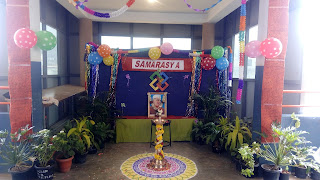In my first post, we explored “What kind of Social Sciences is worth teaching.”
Part 1 of this blog explored the broad 'Aims of History and Social Sciences Education'. In this part, we will explore the ‘value problem’ in these disciplines.
 Should we strive
to elaborate one single set of values within the framework of the Constitution
for the education of all school students throughout the country? I am not sure
as to how far we can or should go in that direction without violating the basic
principle of liberal democracy which is the tolerance of a diversity of values,
including a diversity of conceptions of the good society. If there is one thing
that we ought to be proud of and cherish in the Indian tradition is its
tolerance of the diversity of ways of life among the people of the country. Our
zeal for the promotion of ‘value-based education’ through the social sciences should
not undermine that spirit.
Should we strive
to elaborate one single set of values within the framework of the Constitution
for the education of all school students throughout the country? I am not sure
as to how far we can or should go in that direction without violating the basic
principle of liberal democracy which is the tolerance of a diversity of values,
including a diversity of conceptions of the good society. If there is one thing
that we ought to be proud of and cherish in the Indian tradition is its
tolerance of the diversity of ways of life among the people of the country. Our
zeal for the promotion of ‘value-based education’ through the social sciences should
not undermine that spirit.
Given that since the
time social science has been brought into the mainstream in the context of
education in modern India, all the committees have said the ‘right’ things, the
discipline is yet to get the status it deserves in the opinion of the larger
society. For the larger society, social science is a non-utility subject.
Therefore, there is need to drive home the point that the social sciences are
essential to provide number of skills required to adjust to the globalised
world, and to ‘deal with political and economic realities’.
- The blog piece has been written by Ms. Vasundhara, who works as the School Transformation lead at Mantra4Change.
Part 1 of this blog explored the broad 'Aims of History and Social Sciences Education'. In this part, we will explore the ‘value problem’ in these disciplines.
The teaching of
the social sciences to school children is complicated by what may be called the
‘value problem’ in these disciplines. The separation of value judgment from
judgment of reality - or ‘ought’ questions from ‘is’ questions - does not pose
the same kind of challenges in the natural
sciences that it
does in the social sciences.
There are, of
course, certain basic values embodied in the Constitution of India. The nature
and significance of those values should be explained to students and they
should be encouraged by their teachers to adopt them. But the Constitution sets
down its basic values in very broad and general terms. It is when we come to details
and specifics that the real disagreements come to the surface. As they say, the
devil is in the detail.
 Should we strive
to elaborate one single set of values within the framework of the Constitution
for the education of all school students throughout the country? I am not sure
as to how far we can or should go in that direction without violating the basic
principle of liberal democracy which is the tolerance of a diversity of values,
including a diversity of conceptions of the good society. If there is one thing
that we ought to be proud of and cherish in the Indian tradition is its
tolerance of the diversity of ways of life among the people of the country. Our
zeal for the promotion of ‘value-based education’ through the social sciences should
not undermine that spirit.
Should we strive
to elaborate one single set of values within the framework of the Constitution
for the education of all school students throughout the country? I am not sure
as to how far we can or should go in that direction without violating the basic
principle of liberal democracy which is the tolerance of a diversity of values,
including a diversity of conceptions of the good society. If there is one thing
that we ought to be proud of and cherish in the Indian tradition is its
tolerance of the diversity of ways of life among the people of the country. Our
zeal for the promotion of ‘value-based education’ through the social sciences should
not undermine that spirit.
Finally, if we
believe that diversity is our greatest treasure, we must encourage our students
to take a serious interest in this diversity and to value it. Here the most
significant contribution of the social sciences to the education for citizenship
will be to encourage our students to cultivate an enquiring attitude towards
their own ways of life and a tolerant one towards other ways of life.
In 1964, the
Kothari commission said that one of the aims of teaching social (studies)
science is to help students acquire certain values and attitudes which are
critical for participation in the affairs of the world other than the
acquisition of knowledge of the environment and understanding the human
relationships. And in 2005 in its position paper on social science, the NCF
said that it is important to ‘reinstate the significance of the social sciences
by not only highlighting its increasing relevance for a job in the rapidly
expanding service sector, but by pointing to its indispensability in laying the
foundations for an analytical and creative mindset’.
- The blog piece has been written by Ms. Vasundhara, who works as the School Transformation lead at Mantra4Change.












